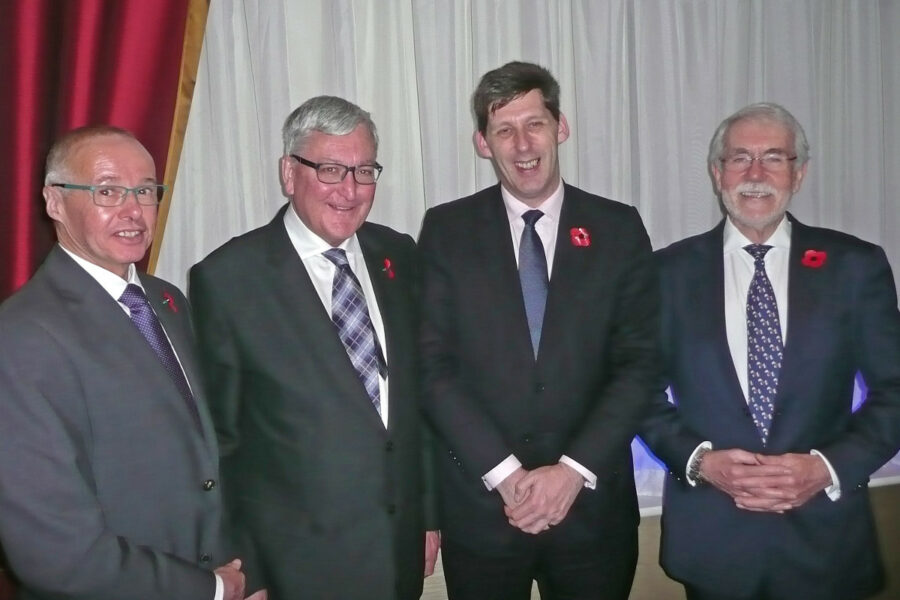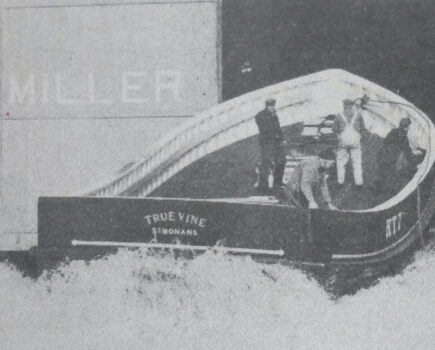The 100 guests who attended the Scottish Fishermen’s Federation annual dinner in Edinburgh on 31 October heard four positive and challenging speeches from rural economy cabinet secretary Fergus Ewing, parliamentary secretary of state for Scotland and for Northern Ireland Lord Ian Duncan, SFF president Ian Gatt, and chief executive Bertie Armstrong. Tim Oliver reports
President: Industry buoyant, but tough Council talks ahead
Healthy fish and shellfish landings and grossings, and investment in new and upgraded vessels and ports, were highlighted by SFF president Ian Gatt.
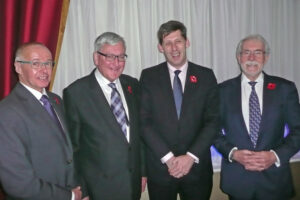
Fergus Ewing (second left) was the guest of honour at the SFF annual dinner. Also speaking were, left to right, president Ian Gatt, Lord Duncan, and chief executive Bertie Armstrong.
In 2017, Scottish vessels landed 466,000t of fish and shellfish worth £560m. Volume was up 3% from 2016, while value was down 1%, although this was driven mostly by a reduction in the price of herring. “Both demersal and shellfish sectors showed a healthy increase in real terms,” he told guests.
Fleet renewal and vessel modernisation continued across all the sectors, and shipyards are ‘extremely busy’, he said.
There have been ‘unprecedented’ development projects in many harbours. He congratulated Peterhead Harbour Authority on completing the port’s harbour and fishmarket development, and noted that the new fishmarket in Lerwick is also under construction.
Ian Gatt also highlighted the importance of marketing, and of catchers and processors working together.
He noted that Seafood Scotland had convened an independent strategic review of the support function of Seafood Scotland, and the formation of a new Scottish Seafood Federation of processors. He said the SFF would play its part ‘in building strength through co-operation’.
ICES advice
The SFF president said that the ICES scientific advice for 2019 had provided challenges for both government and industry. “Forthcoming bilateral negotiations with Norway, and the dreaded December Council, are going to be tough,” he told guests.
The aim would be to find a balance between the fleet having enough quota to ensure viable fisheries next year, and stocks being fished sustainably. “SFF is committed to working with the Scottish government to realise that goal.”
There was the potential for the SFF to become ‘an international leader in scientifically evidenced, sustainable fishing’. The federation’s scientist, Elena Balestri, had created ‘a science industry network’ comprising scientists working for SFF associations and Scottish POs, to take forward collective scientific work.
“SFF continues to play a pivotal role in data collection through the SFF Services-operated Independent On-Board Observer Scheme and Gear Innovation and Technology Advisory Group,” said Ian Gatt.
“These EMFF and Scottish government co-funded projects help to gather important fisheries management data, and facilitate the development and trial of innovative fishing gears, exploring practical solutions aimed at reducing the amount of discards.”
Safety
Ian Gatt said the new ILO 188 safety regulations would be a major feature of 2019, and that the SFF was ‘committed to working with the MCA to ensure that the implementation period goes as smoothly as possible’.
He said it was important that legislation was introduced in a manner that vessel owners can comply with, but equally that injuries and fatalities must ‘significantly reduce’. It was necessary to look after the health of fishermen as well as fish stocks – as SFF safety officer Derek Cardno had pointed out directly to the cabinet secretary.
Charities support
The Scottish Fishermen’s Trust reached a landmark in 2018 when its support for ‘a broad spectrum’ of charities passed £1m.
“Significant grant awards have been made, in particular to safety and science projects,” said Ian Gatt. He thanked the board of SFF Services Ltd, ‘without which, the charity could not continue to support these great projects’.
Scottish minister: Brexit ‘looms large’ over December talks
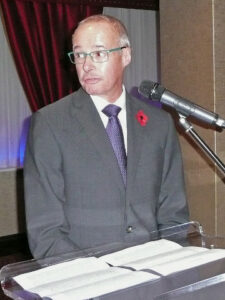
SFF president Ian Gatt was upbeat about industry health, but warned of a tough December Council ahead.
Brexit will change the dynamics of this year’s December Fisheries Council, and the talks are expected to be dominated by the need to find TAC and quota outcomes that resolve choke issues.
This was the view of Scottish fisheries secretary Fergus Ewing, giving the keynote speech at the annual dinner of the Scottish Fishermen’s Federation in Edinburgh last week.
The minister also warned that scientific advice for 2019 on several important stocks is ‘challenging’, and that solutions had to be found to the choke species problem as the discards ban comes fully into force in January (Fishing News, 8 November, ‘Warnings on discards ban’).
In a wide-ranging speech, Fergus Ewing called for closer co-operation between the Westminster and Scottish governments on fisheries issues, which he said was not always forthcoming.
He said he would soon be launching a debate/consultation in Scotland over future fisheries management, and would shortly be announcing tighter economic links for vessels landing in Scotland.
He told guests that Brexit ‘looms large’ over the December Council negotiations on 2019 TACs and quotas, and that ‘negotiation dynamics are likely to be different this year, given this wider political landscape’.
“Technically, this year’s talks will be ‘business as usual’, given that we will still be a member state. However, we can expect the wider scenarios still in play around Brexit to have some influence in what we may expect to achieve.”
While this could make things more difficult, it could potentially give the UK a new lever in the talks, because the Commission will want to strike a deal the UK is happy with, and will honour during 2019, in the event of a no-deal Brexit.
Also, third countries such as Norway, Faroes and Iceland will wish to agree stable fisheries agreements in 2019, and ‘this is already playing out in current negotiations’.
He said officials were ‘working very hard’ behind the scenes to prepare the ground with the Commission, and discussions were underway with stakeholders to develop negotiating positions ahead of the talks.
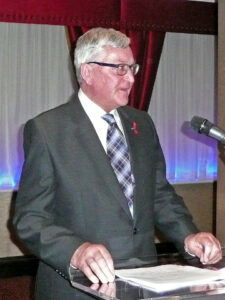
Fergus Ewing will be launching a national debate in Scotland on future fisheries management.
Fergus Ewing stressed that Scotland’s voice must be heard in these and the Brexit negotiations, but said that the UK government did not always give the same weight to fisheries issues as Scotland, and sometimes took too long to make decisions – the fisheries concordat on fisheries management relationships between Westminster and the devolved administrations was an example.
“In my experience… things simply take too long, far longer than required, within the UK, perhaps because the UK doesn’t attach the same weight of importance to fisheries matters as we obviously do. The message is this – we genuinely seek to co-operate, but it’s not always easy to secure that in practice.”
Brexit
Turning to Brexit, Fergus Ewing said the Scottish government would take ‘whatever steps may be necessary to protect Scotland’s marine interests’ in the event of a no-deal Brexit. He said the new fisheries bill was ‘far from perfect’, but was ‘a good example of what can be delivered through partnership working’.
The Scottish government had focused on ‘constructive engagement’ to protect and advance Scotland’s fishing interests, and DEFRA had responded in a similar fashion with regard to the fisheries bill, ‘taking on board our advice and expertise’.
For example, Scottish officials had persuaded the UK government ‘to refrain from seeking new powers over quota for the secretary of state that would have clearly undermined the powers of the Scottish parliament’.
The cabinet secretary said it was ‘particularly gratifying’ that the UK government ‘has clearly and unambiguously recognised the devolved nature of fisheries, and the need for our legislative consent – and in doing so, has acknowledged that Scottish fisheries are best managed in Scotland’.
But he cautioned that some of the outcomes will take time to achieve, and said that ‘we must guard against making promises that are not capable of being delivered’.
The Scottish minister also warned of the possible Brexit implications of the French aggression against UK scallopers fishing lawfully in the Baie de Seine in August. “I fear that this may be a harbinger of things to come, as we move into a new relationship with the EU and its member states,” he said.
Healthy industry
“The Scottish fishing industry continues to go from strength to strength, with encouraging investment across all sectors,” Fergus Ewing told guests.
Scottish landings in 2017 remained high at £560m, and mackerel was still the most significant stock, with landings in 2017 worth £126m – around one-third of overall landings.
“The industry is in good health and good heart. There are millions of pounds-worth of investment taking place by individual families – not large faceless corporate organisations, as has recently been alleged.” He stressed that he wanted ‘a thriving fishing industry across all sectors’ – including the inshore and onshore sectors.
New legislation had strengthened management of the inshore sector, but competition for space was ‘a constant challenge’ for this sector.
And in the onshore sector, good progress had been made in developing and expanding markets for Scottish langoustines and crab in Japan and Europe.
The cabinet secretary also stressed the need for a safe and well-equipped fleet, and that this was a funding priority. His experience with the sinking of the Nancy Glen in January had brought home to him the importance of safety.
“I was brought face to face with those coming to terms with their loss. It was a humbling but also an inspiring experience to see the dignity and strength of the families, and of the community in Tarbert. Christmas this year will be a difficult season, and it’s a timely reminder to us all of the precedence of safety over all other concerns.”
He said he would continue to press the case to the UK government for continued funding for safety measures when EU funding ends.
Economic links
Fergus Ewing said he was concerned by the downstream impacts of potentially significantly reduced mackerel catches in 2019, and the effects on Scottish processors reliant on a certain level of landings in Scotland. “Despite a price differential in favour of landing mackerel into Scotland rather than Norway, the proportion of mackerel actually landed abroad increased in 2017,” he said.
“I think we all acknowledge that fish are a public resource, and I am determined that the optimum level of public benefit is derived from our fisheries. It remains my intention to introduce, as soon as possible, new economic links criteria for Scottish vessels that will lead to higher landings in Scotland.
“Officials are currently finalising the details of the policy. I will meet with the industry in advance of any announcement.”
Future vision
“My vision is for a first-class fisheries management system in Scotland, managed co-operatively by government and the industry – sustainable, profitable and socially responsible. We have a unique opportunity to start building this. I will be launching a national discussion paper on how we will manage Scotland’s fisheries.”
Fergus Ewing said he stood by his earlier commitment to the current FQA system. “New fishing opportunities may emerge as a result of Brexit, and I believe there is scope to be creative with new opportunities – eg supporting inshore fisheries, encouraging new entrants, and promoting sustainable practices.
“A new fisheries system provides us with the opportunity to throw off ill-fitting policies and design new, tailored solutions – a new adaptable catching policy, as an alternative to rigid, unenforceable targets; a system designed to fit from the bottom up, ensuring that the industry both fully benefits from, and takes responsibility for, the resources it relies on.”
‘The world can be our market’
SFF chief executive Bertie Armstrong emphasised the ‘Sea of Opportunity’ that Brexit will create for the fishing industry, and the progress that had been made since ‘the fateful night in June 2016 when the box of strategic possibilities for the fishing industry was opened’.
He said it opened up ‘a truly strategic set of prospects’ for the UK seafood industry, particularly in Scotland.
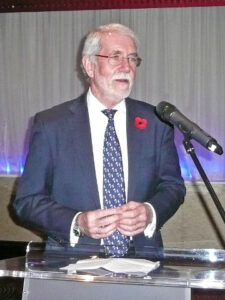
SFF chief executive Bertie Armstrong called for government commitment to securing the Brexit potential
for the fishing industry.
Spelling out the progress that had been made since the referendum on securing the better future for the industry that Brexit promises, he said the fishing industry was ‘more visible than at any time in the last 45 years’.
“Our polling indicates strongly that we have the agreement of the general public – Leaver, Remainer, coastal, urban, rural – across the political persuasions; all agree that fishing is one area that Europe did not serve well,” he told guests.
Britain’s seafood resource had been ‘collectivised’ with the considerably smaller resources of the other northern member states, and ‘shared out to the advantage of all except us’.
Since the vote to leave the EU and CFP, the federation’s arguments for Britain to be an independent coastal state, governing access to its own waters and resources, and for fairer quota shares aligned to zonal attachment, had been ‘accepted and embedded in policy’.
“In a continuous round of lobbying and argumentation, and a long series of individual meetings with decision-makers including the prime minister, we have witnessed the solidification of that policy along its way into statute, firstly in the now well-known series of policy speeches from the PM, then into the letter and spirit of the fisheries white paper, and finally onto the face of the newly published fisheries bill.”
There were challenges and work ahead, ‘but we are unequivocally looking for practical support from all the governments in charge of the fishing fortunes of this northern land’, said Bertie Armstrong.
“The prize is far too large – I speak of the UK overtaking Iceland by volume and value in the globalised world of seafood – for any half-hearted approaches, such as making the best of an inevitability, or allowing challenges to become defeatism. No, instead we want commitment to executing the Sea of Opportunity in the terms already stated, for a new independent coastal state with a place on the world stage.”
He said the federation was already thinking ahead to the new opportunities beyond Brexit.
An example was an approach made to the federation by the US Embassy in London. This resulted, after a series of meetings, in the US ambassador visiting the new Peterhead market. This was followed by an invitation for the SFF and processors whom the ambassador had met in Peterhead to visit the US Embassy to discuss what the next steps might be.
“If Brexit for fishing is properly handled, the world will be our market for mackerel, haddock and langoustine,” said Bertie Armstrong.
Governments must deliver for the fishing industry
“We need to be outside of the CFP as a matter of urgency. In truth, we should be outside it now. It has done harm, not just to the fisheries inside the UK waters, but unfortunately far wider than that.”
This was the view expressed by Lord Ian Duncan, parliamentary secretary of state for Scotland and for Northern Ireland, a former Scottish MEP, and former assistant chief executive of the SFF.
Lord Duncan told guests that the CFP had been ‘insidious’, and had failed fishermen. And he said that when David Mundell, secretary of state for Scotland, said it was ‘a red line’ that we should be outside the CFP in December 2020, ‘you have the word of a man who is going to deliver for you’.

Lord Duncan: “If your governments fail you, vote us from office.”
“As an MEP, I was constantly reminded of the challenges faced by fishermen across the EU, from policies that were often thought through by bureaucrats who had little contact with the sea, and little contact with fishermen,” he said.
“Their first response when dealing with fishermen was ‘they must be wrong, and they’re biased, and they’re not to be trusted’, and you would see that time and time again.”
He said that the Westminster and Scottish governments now had to be sensitive to the needs of Scottish fishermen, and to the fishermen in the wider UK.
A serious challenge was to boost recruitment to the industry throughout the UK. “In the past, generation after generation would continue in the industry, but we almost broke the link 10 to 15 years ago. We’ve got to reconnect that link and bring people back to the sea. It’s not enough to rely on people coming from the Philippines any more – we’ve got to do more than that,” he said.
Lord Duncan urged the Scottish industry to grasp the opportunities offered by the new fisheries bill. “Although you may think it is primarily centred upon fisheries in England, it isn’t. You too need to be part of the lobbying process and the changes, to make sure it’s fit for purpose, and there are serious challenges, not least the discards ban,” he told guests.
He said the discards ban was ‘a political ban’ that needed to be reformed so that it works in practice.
Another opportunity would be the reform of EU regulations, including the technical regulations, and how scientific research is applied. The bill would be both an opportunity and a challenge for the Scottish government.
“What shall they do, both alongside the UK government and independently of the UK government?” he asked.
He stressed that although fisheries remains devolved, the UK will have to negotiate with third-country governments, where it will be necessary for the devolved administrations to collaborate effectively.
“The challenge for your governments is to recognise how they are able to deliver what it is that you need, because if I’m being very honest, you’ve been bullshitted a lot in the past, and it’s got to stop,” he said.
“We’ve got to be able to hear you, respond to it, and change, and that won’t be easy.”
Lord Duncan continued, “A number of civil servants, north and south of the border, suffer from ‘Stockholm syndrome’ – the inability to believe they could ever be outside the EU, the inability to believe that policies could really change.
“The number of times I’ve encountered civil servants who’ve prefaced remarks with ‘if we leave the European Union’ – it’s surprising how often we have to correct that.”
He said the challenges ahead would be met, and the industry deserved the benefits of the ‘Sea of Opportunity’.
He concluded, “I’ve no doubt – no doubt – that the growth will be great, opportunities will be realised; that the American market, the wider market, will be something you can capture, based upon sustainability, the labours of the past 20 years, and the sweat of your brow.
“You will make this industry continue to grow, not just what you see in Peterhead, but you will see it across the land, and that’s something your two governments have to commit to. You have to hold us to account, and if we fail you, vote us from office.”
Raffle raises £1,500 for Mission
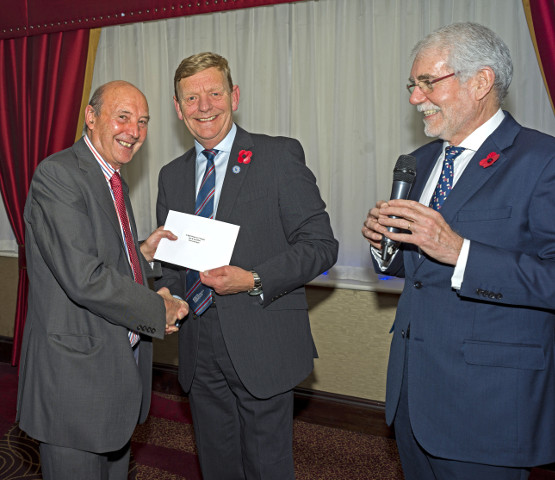
Commodore David Dickens, chief executive of the Fishermen’s Mission, presenting the second prize in the raffle to Tim Oliver. (Photo: Paul Riddell)
A raffle to raise funds for the Fishermen’s Mission, held during the dinner, raised £1,386, which the SFF topped up to £1,500.
The first prize of a £500 travel voucher, donated by Kinnaird Travel of Fraserburgh, was won by Finlay Carson, the MSP for Galloway and West Dumfries.
The second prize of a two-night stay at the Marriot Hotel in Edinburgh, where the dinner was held, donated by the hotel, went to Tim Oliver of Fishing News, while the third prize of a copy of John Goodlad’s new book The Cod Hunters, donated by the author, was won by Aoife Martin.

